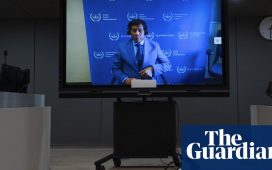Israel appears to be in breach of the orders issued a fortnight ago by the international court of justice requiring it to take immediate steps to protect Palestinians’ rights and cease all activities that could constitute genocide, the UN special rapporteur on the occupied territories, Francesca Albanese, has said.
The Israeli government was given until 23 February to report to the ICJ on what it has done to comply with six orders the court issued, including one relating to ending incitement to genocide and another requiring immediate steps to improve the supply of humanitarian aid.
Senior western officials say that despite hours of negotiations with Israeli officials there is at best a marginal and incremental improvement since the 26 January ruling. “Safe to say, it’s dire and getting worse,” one said.
The ICJ did not direct Israel to announce a ceasefire, as South Africa had requested, but by very large majorities the judges did make orders that were intended to have practical effect.
First, Israel was required to “take all measures within its power to prevent and punish the direct and public incitement to commit genocide” in relation to Palestinians in Gaza, after the court found “discernibly genocidal and dehumanising rhetoric coming from senior Israeli government officials”.
Second, the ICJ required Israel to “take immediate and effective measures to enable the provision of urgently needed basic services and humanitarian assistance”.
Israel was further required to take all measures within its power to prevent, within the scope of the genocide convention, the killing of Palestinians, causing them serious bodily or mental harm, inflicting conditions of life calculated to bring about its physical destruction in whole or in part, and imposing measures intended to prevent births.
Many lawyers have interpreted this to mean that the acts mentioned are not prohibited so long as Israel undertakes them without genocidal intent – which Israel says is the case, and which the court will not test in full until later. Albanese, however, said she disagreed, and that the ICJ had mandated Israel to cease all activities that could constitute genocide.
Despite this, she said, the violence and the demolition of civilian infrastructure had continued, aggravating the harsh living conditions in Gaza. “The fatalities are not solely the result of bombings and sniper attacks,” she said in an interview with the Guardian. “They also occur due to a scarcity of medical supplies and treatment, and, most distressingly, due to inadequate access to food and potable water, forcing consumption of contaminated or polluted water.”
At least 1,755 Palestinians have been killed in Gaza since the court order.
The Israeli prime minister, Benjamin Netanyahu, has said Israel has an “unwavering” commitment to international law and to its “sacred commitment to continue to defend our country and defend our people”. He has described the ICJ case as a “vile attempt to deny Israel this fundamental right”. The US – which has supported Israel in the aftermath of Hamas’s 7 October attacks – has called it “meritless”.
““Like every country, Israel has an inherent right to defend itself,” Netanyahu said. “The vile attempt to deny Israel this fundamental right is blatant discrimination against the Jewish state, and it was justly rejected.”
Lawyers have argued that the extent of Israel’s compliance with the orders is a test not only of the top UN court’s authority, but of other signatories to the genocide convention.
Yussef Al Tamimi, a visiting fellow at New York University school of law, pointed out that ICJ case law – notably the Bosnia v Serbia ruling in 1996 – specifies that states have the responsibility “to employ all means reasonably available to them, so as to prevent genocide so far as possible”.
He said that applied equally to states with “the capacity to influence effectively the action of persons likely to commit, or already committing, genocide”. In the Serbia judgment, the ICJ found “a state bore responsibility if it was aware, or should normally have been aware, of the serious danger that acts of genocide would be committed”.
This places stricter obligations on states that provide financial, intelligence and military assistance to Israel’s campaign in Gaza, he said. South Africa’s lawyers intend to press further over Israeli compliance with the ICJ’s orders and third parties over their obligations.
The case accusing Israel of genocide was brought by South Africa but others have since taken action. Nicaragua has asked to join the case on the basis, it says, that Israel is breaching the convention, and Algeria – the current lead Arab nation on the UN security council – has tabled a resolution endorsing the ICJ’s orders and adding that a humanitarian ceasefire is the prerequisite for them to be implemented, something the court itself did not say.
The US is opposed to the resolution. “This draft resolution could put sensitive negotiations in jeopardy, derailing the exhaustive, ongoing diplomatic efforts to secure the release of hostages, and secure an extended pause that Palestinian civilians and aid workers so desperately need,” the US ambassador to the UN, Linda Thomas–Greenfield, said a week ago.
Independent of the ICJ, Belgium has banned arms sales to Israel, Japan’s Itochu Aviation has informed its Israeli partner it will end strategic cooperation by the end of February, and the Dutch appeal court will decide next week whether or not the government is entitled to sell F-16s to Israel.
Yuval Shany, the Hersch Lauterpacht chair in international law at the Hebrew University of Jerusalem, said Israel’s presentation to the ICJ could become a dynamic process rather than the submission of a single report.
“It is open to South Africa, on the basis of significant factual changes on the ground, to seek a change to the language in the order, or more substantially to seek new orders,” he said. “In the case of Armenia v Azerbaijan, Armenia twice failed in bids to seek modifications, but twice succeeded in adding new orders … the 26 January orders may not be the last word.”
Shany said the two most important concerns in the court’s orders last month were aid and incitement.On both , it is hard to argue that Israel has been in compliance. The central evidence on incitement is a conference organised by the ultranationalist Otzma Yehudit in Jerusalem three days after the ICJ ruling, in which the national security minister, Itamar Ben-Gvir, articulated a twin-track approach – encouraging the exodus of Gaza’s inhabitants while encouraging the influx of Israeli settlers. He argued it was “a correct, just, moral and humane solution”.
At the same event the chair of the major settler organisation Nahala, Daniella Weiss, was more explicit. Asked what would happen to the 2 million Palestinians in Gaza, she said: “The Arabs will move.” Just as Israel “doesn’t give them food” in order to pressure Hamas to release the hostages, so too should Israel “not give them anything, so they will have to move”, she said. One of the videos shown at the conference was a clip of soldiers waiting to join the ground invasion chanting: “There are no innocents in Gaza.” The conference was attended by 11 cabinet ministers and 15 members of the coalition.
The US described Ben-Gvir’s remarks as inflammatory, but the Israeli prime minister, Benjamin Netanyahu, who depends on his support to remain in office, has been silent. Similarly, little has been done to stop the stream of IsraelDefense Forces messages glorifying victory over the Palestinian people rather than Hamas.
The most serious infraction has occurred over the order concerning aid. The UN office for the coordination of humanitarian affairs reported on 5 February: “In the northern Gaza and Gaza governorates, the humanitarian situation has reached an exceedingly critical state, exacerbated by existing restrictions that impede the delivery of essential aid.”
It also pointed out that the Israeli authorities denied access to 56% of humanitarian aid missions planned for northern Gaza (34 out of 61) and 25% of missions planned for the middle area (28 out of 114) in January. Since 26 January the number of trucks allowed to enter Gaza, an inadequate metric, never exceeded 218 and was typically below 150.
Israeli rightwingers have blocked the Kerem Shalom crossing to prevent the entry of aid into the strip since 26 January and police have so far not removed their tents. The UN also noted that despite promises, checkpoints had not once been opened at 6am when operational conditions were optimal for delivering aid.
Many western governments which have engaged in months of fruitless negotiation to increase aid see an accumulation of bureaucratic hurdles and a reluctance to do anything that might help Hamas.
Cogat, the Israeli military body that liaises with the UN over aid, insists the humanitarian crisis is not as described by the agencies. It pointed out that 15 bakeries were operational in Gaza on Thursday, providing more than 2m loaves, rolls, and pitas a day for the local population. The number of operational bakeries had risen from 10 to 15 over the past two weeks, it said.
British and US officials think it would be possible to double the amount of aid entering Gaza relatively quickly, and are assured by Israel that its strategic intent is to “avoid a humanitarian catastrophe”. They also admit, however, that as long as Israel approaches each tactical and operational decision across the board on the basis that goods may be diverted to Hamas, the outcome can only be insufficient aid.
Kate Ferguson from Protection Approaches, a British NGO, told the UK foreign affairs select committee this week why the US and UK response to the ICJ case matters: “You cannot have approaches to mass atrocity crimes that are inconsistent. Inconsistency is the enabling factor for impunity everywhere.”










